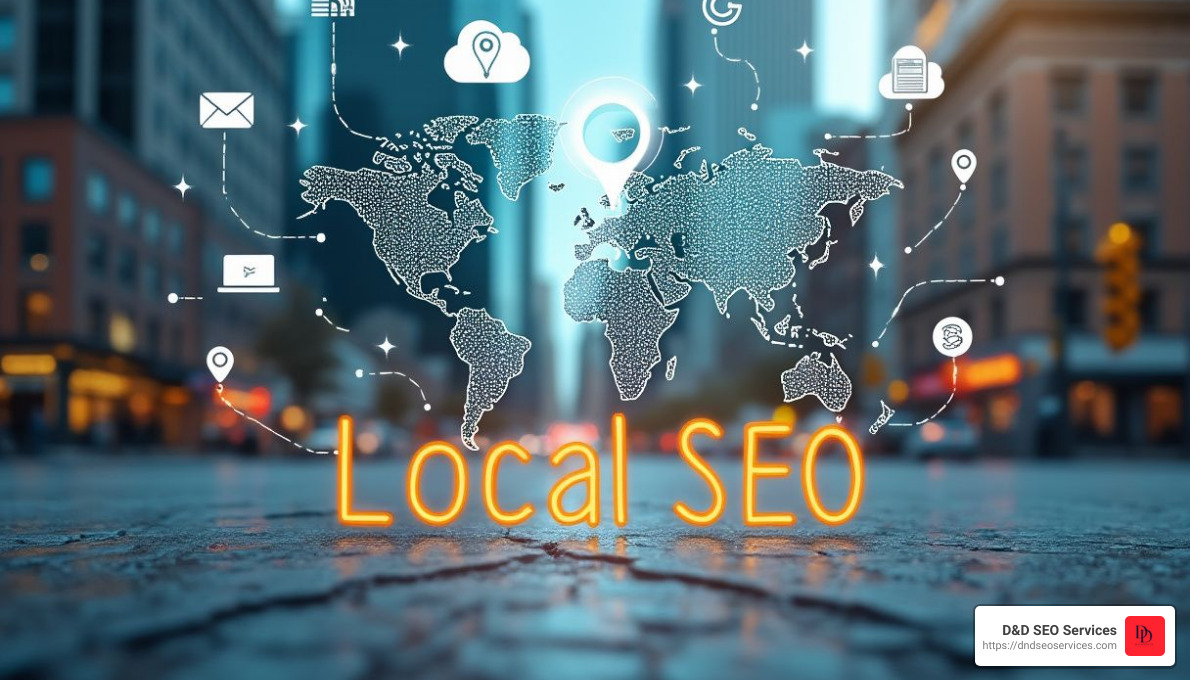Local Strategies: How Better Online Reputation Drives Revenue is crucial for local businesses in today’s digital age. Here’s a quick breakdown:
- Boosts First Impressions: Positive online reviews attract new customers.
- Improves Trust and Credibility: High ratings build customer confidence.
- Improves Search Engine Rankings: Better reputation means better visibility.
- Increases Customer Retention: Satisfied customers return and refer others.
- Provides Competitive Advantage: Stand out in a crowded market.
In the digital world, how customers perceive your business online can make or break your success. Potential customers almost always search for a business online before making decisions. Good reviews and a strong online presence are essential to creating favorable first impressions.
“For instance, just by using Podium, Schoonover BodyWorks’ monthly review volume increased by 600%, and the business got a Google rating boost from 4.4 to 4.9 stars.”
Customer trust is essential. People are more likely to choose a business with high ratings and positive feedback. A solid online reputation not only builds trust but can also significantly boost your revenue.
I’m Danielle Birriel, the CEO of D&D SEO Services. With over ten years of helping local businesses thrive, I’ve seen how ‘Local Strategies: How Better Online Reputation Drives Revenue’ can transform a business’s online presence and lead to impressive growth.
Local Strategies: How Better Online Reputation Drives Revenue vocab to learn:
Step 1: Monitor Your Online Presence
Monitoring your online presence is the first step in building a better online reputation. This involves keeping an eye on what people say about your business across various platforms.
Why monitor? Because knowing what’s being said allows you to respond promptly, address issues, and maintain a positive image.
Tools for Monitoring
Several tools can help you stay on top of your online presence:
-
Google Alerts: This free tool notifies you whenever your business is mentioned online. Just set up alerts with your business name, and you’ll get emails whenever new content appears.
-
Hootsuite: This social media management tool lets you track mentions of your business across different social media platforms. It consolidates all your social media activity in one place, making it easier to manage.
-
Sprout Social: Similar to Hootsuite, Sprout Social helps you monitor social media mentions and engage with your audience. It also provides analytics to help you understand your social media performance.
-
Mention: This tool tracks mentions of your business across the web, including blogs, news sites, and forums. It’s great for getting a comprehensive view of your online presence.
-
Google My Business: Claiming and optimizing your Google My Business listing is crucial. It allows you to manage your business information on Google Search and Maps, respond to reviews, and see how people interact with your listing.
-
Yelp for Business Owners: Yelp is a popular review site where customers leave feedback about their experiences. By claiming your business on Yelp, you can respond to reviews and keep your information up to date.
-
Trustpilot: This review platform lets you collect and showcase customer reviews. Responding to reviews on Trustpilot shows that you value customer feedback and are committed to improving.
Key Benefits of Monitoring Tools:
- Real-Time Alerts: Get notified instantly when someone mentions your business.
- Centralized Management: Manage all your social media and review site activities from one dashboard.
- Customer Engagement: Quickly respond to customer reviews and comments, showing you care about their feedback.
How to Use These Tools Effectively
- Set Up Alerts: Use Google Alerts to monitor mentions of your business name, products, and key personnel.
- Consolidate Platforms: Use Hootsuite or Sprout Social to manage multiple social media accounts from a single platform.
- Engage Promptly: Respond to reviews and comments as soon as you can. Quick responses show customers that you value their input.
- Analyze Sentiment: Tools like Mention help you understand the tone of the mentions. Are they positive, negative, or neutral? This insight helps you address issues before they escalate.
Monitoring your online presence is an ongoing process. Regularly check these tools and stay engaged with your audience. Keeping a pulse on what’s being said about your business allows you to maintain a positive online reputation and, ultimately, drive revenue.
Next up, we’ll dive into how to encourage positive reviews to further improve your online reputation.
Step 2: Encourage Positive Reviews
Positive reviews are gold for your business. They build trust and can significantly boost your local SEO. Here’s how you can encourage more of them.
Incentive Programs and Follow-Up Emails
One of the easiest ways to get more reviews is to ask for them. But sometimes, a little incentive can go a long way.
-
Incentive Programs: Offer small discounts or freebies in exchange for reviews. Just make sure it complies with the review platform’s guidelines. For example, “Leave a review and get 10% off your next purchase!”
-
Follow-Up Emails: After a customer makes a purchase, send a follow-up email asking for a review. Make it easy by including a direct link to your review page. A simple message like, “Loved your experience? Share your thoughts here!” can be very effective.
In-Store Signage
Don’t underestimate the power of in-store prompts. Use signage to remind customers to leave a review.
- Example: Place a sign near the exit or checkout area saying, “Enjoyed your visit? Leave us a review on Google!” Include a QR code for easy access.
Responding to Reviews
Engaging with reviews shows that you care about customer feedback. It also helps build a positive online reputation.
-
Positive Reviews: Always thank the customer. Highlight specific points they mentioned to show you’re paying attention. For example, “Thank you for your kind words about our fast service, Jane! We’re thrilled you had a great experience.”
-
Negative Reviews: Address the issue calmly and offer a solution. “We’re sorry to hear about your experience, John. Please contact us at [your email] so we can make things right.” This not only shows you care but also gives you a chance to turn a negative situation into a positive one.
Customer Appreciation and Problem-Solving
Showing appreciation for your customers can lead to more positive reviews. When customers feel valued, they’re more likely to leave a good review.
-
Customer Appreciation: Send thank-you notes or small tokens of appreciation to loyal customers. This personal touch can encourage them to leave positive feedback.
-
Problem-Solving: Use negative reviews as an opportunity to improve. If multiple customers mention the same issue, take steps to address it. This not only improves your service but also shows that you’re listening.
Quick Recap
- Incentive Programs: Offer discounts or freebies for reviews.
- Follow-Up Emails: Send emails with direct links to your review page.
- In-Store Signage: Use signs to remind customers to leave reviews.
- Responding to Reviews: Engage with both positive and negative reviews.
- Customer Appreciation: Show your customers they’re valued.
Encouraging positive reviews is an ongoing effort. Keep asking, keep appreciating, and keep improving. Next, we’ll talk about how to optimize your website and social media profiles for better local SEO.
Step 3: Optimize Your Website and Social Media Profiles
Leveraging Local SEO
Optimizing your website and social media profiles is crucial for improving your local SEO and overall online presence. Let’s break down how to do it effectively.
Website Optimization
Your website is often the first impression potential customers have of your business. Make sure it’s polished and up-to-date.
- Contact Information: Ensure your name, address, and phone number (NAP) are consistent across all pages. This consistency helps search engines verify your business information.
- Business Hours: Clearly list your business hours. This helps customers know when they can reach you and improves your local SEO.
- Service Synopsis: Provide a brief but detailed summary of your services. Use bullet points for easy readability.
- Local Keywords: Incorporate local keywords into your content. For example, if you’re a plumber in San Diego, use phrases like “best plumber in San Diego” or “San Diego plumbing services.”
Social Media Profiles
Claim and optimize your social media profiles on major platforms like Facebook, Instagram, Twitter, and LinkedIn.
- Basic Information: Include your NAP, business hours, and a link to your website. This ensures consistency and helps with local SEO.
- Profile Picture and Cover Photo: Use a high-quality logo for your profile picture and an engaging cover photo that represents your brand.
- Engagement: Regularly post updates, offers, and events. Engage with your audience by responding to comments and messages promptly.
Google My Business Listing
Your Google My Business (GMB) listing is a powerful tool for local SEO. It helps your business appear in local search results and on Google Maps.
- Claim Your Listing: If you haven’t already, claim your GMB listing.
- Complete Your Profile: Fill out all the information, including your NAP, business hours, services, and photos. The more complete your profile, the better.
- Posts and Updates: Use Google Posts to share updates, offers, and events. This keeps your profile active and engaging.
- Customer Reviews: Encourage customers to leave reviews on your GMB profile. Respond to all reviews to show that you value customer feedback.
NAP Consistency
Consistency in your NAP information across all online platforms is crucial for local SEO.
- Crawlable HTML Text: Ensure your NAP is in HTML text format, not images, so search engines can read it.
- Footer/Header Placement: Place your NAP in the footer or header of your website for easy access.
- Contact Page: Include your NAP on your contact page for consistency.
By optimizing your website and social media profiles and ensuring NAP consistency, you can significantly improve your local SEO and online reputation. This not only boosts your search engine rankings but also improves user experience, leading to higher engagement and conversions.
Quick Recap
- Website Optimization: Ensure NAP consistency, list business hours, and use local keywords.
- Social Media Profiles: Claim and optimize profiles with basic information and engage regularly.
- Google My Business Listing: Complete your profile, use Google Posts, and encourage customer reviews.
- NAP Consistency: Maintain consistent NAP information across all platforms.
Next, we’ll discuss how to engage with your audience to build a strong online reputation.
Step 4: Engage with Your Audience
Proactive Issue Resolution
Engaging with your audience is essential for building a strong online reputation. It helps create a loyal customer base and encourages positive reviews. Here’s how to do it effectively:
Customer Engagement
Regular engagement with your customers can make a huge difference. Use various channels to keep in touch:
- Email Newsletters: Send out regular newsletters with updates, offers, and helpful tips. This keeps your audience informed and engaged.
- Social Media Posts: Post consistently on platforms like Facebook, Instagram, and Twitter. Share updates, behind-the-scenes content, and customer stories.
- In-Person Meetings: Whenever possible, meet your customers face-to-face. This personal touch can build strong relationships.
Proactive Issue Resolution
Addressing issues before they become problems is key to maintaining a good reputation. Here’s how:
- Customer Feedback: Regularly ask for feedback through surveys or direct questions. This shows you value their opinion and are committed to improvement.
- Trend Monitoring: Keep an eye on feedback trends. If you notice recurring issues, address them promptly.
- Problem-Solving: When issues arise, resolve them quickly and professionally. This can turn a negative experience into a positive one.
Case Study: Schoonover BodyWorks
Schoonover BodyWorks increased their monthly review volume by 600% and boosted their Google rating from 4.4 to 4.9 stars by using proactive customer engagement and feedback tools. This shows the power of staying engaged and addressing issues promptly.
Example Response to a Negative Review
If a customer leaves a negative review, respond quickly and professionally:
Customer Review: “The service at the downtown location was slow.”
Your Response: “We apologize for the slow service at our downtown location. We’re addressing this issue to improve. Thank you for your feedback!”
Quick Tips
- Stay Active: Regularly post on social media and send out newsletters.
- Ask for Feedback: Use surveys and direct questions to gather customer opinions.
- Monitor Trends: Keep an eye on feedback trends to catch issues early.
- Resolve Problems: Address issues quickly and professionally to maintain a positive reputation.
By engaging with your audience and resolving issues proactively, you can build a strong online reputation that drives revenue.
Next, we’ll discuss the benefits of partnering with influencers and local media to further improve your online presence.
Step 5: Partner with Influencers and Local Media
Building Strong Relationships
Partnering with local influencers and media can significantly boost your business’s visibility and credibility. Here’s how to do it effectively:
Local Influencers
Local influencers have a direct connection with your target audience. Collaborating with them can lead to authentic endorsements that resonate with potential customers.
- Authentic Endorsements: Influencers can provide genuine reviews and testimonials about your products or services, which can build trust with their followers.
- Increased Visibility: By featuring your business on their social media, blogs, or videos, influencers can introduce your brand to a wider audience.
Case Study: Fusion Accountants
Fusion Accountants gained significant exposure by being featured in an article about factors companies should consider when choosing an accounting firm. They provided expert quotes, which added authority to the article and increased their visibility.
Media Coverage
Getting featured in local media can also improve your online reputation. Media coverage lends credibility and can attract new customers.
- Press Releases: Share newsworthy updates about your business with local newspapers, TV stations, and online news platforms.
- Event Sponsorships: Sponsor local events or charities to get mentioned in their media coverage. This not only increases visibility but also shows your community involvement.
Example: Agnes Marketing
Agnes Marketing received a local link and media coverage by sponsoring a Liverpool-based networking event. This boosted their online presence and credibility.
Building Strong Relationships
Maintaining good relationships with influencers, media, and customers is crucial. Here’s how to do it:
- Customer Service: Provide excellent customer service to ensure positive experiences and reviews. Happy customers are more likely to share their experiences online.
- Customer Appreciation: Show appreciation by thanking customers for their business and feedback. This can be done through personalized emails, discounts, or special offers.
- Follow-Up Communication: Regularly follow up with customers after a purchase or service. This shows you care about their satisfaction and can lead to repeat business.
Quick Tips
- Identify Influencers: Find local influencers who align with your brand values.
- Pitch Stories: Share interesting stories or news about your business with local media.
- Engage Regularly: Keep in touch with influencers and media contacts to build lasting relationships.
- Show Appreciation: Always thank customers and partners for their support and feedback.
By partnering with local influencers and media, and building strong relationships, you can improve your online reputation and drive revenue.
Next, we’ll answer some frequently asked questions about local strategies and how a better online reputation drives revenue.
Frequently Asked Questions about Local Strategies: How Better Online Reputation Drives Revenue
How can I improve my online reputation management?
Improving your online reputation management starts with monitoring your online presence. Use tools like Google Alerts, Hootsuite, and Mention to track what’s being said about your business. Regularly check platforms like Google My Business, Yelp, and Trustpilot for new reviews and mentions.
Encourage positive reviews from satisfied customers by asking for feedback in person, via email, or on receipts. Respond to all reviews—thank customers for positive feedback and address any negative comments professionally. This shows you value customer opinions and are committed to improvement.
Optimize your website and social media profiles by keeping your contact information, business hours, and services up-to-date. Use local SEO techniques to ensure your business appears in local searches.
Engage with your audience through social media posts, email newsletters, and in-person interactions. Proactively resolve issues before they escalate by monitoring customer feedback and addressing concerns promptly.
What are the benefits of having a good online reputation?
A good online reputation offers numerous benefits for your business:
- Increased Trust and Credibility: Customers are more likely to trust and choose businesses with positive reviews and high ratings. According to a study, 53% of customers won’t go to a business rated under four stars.
- Higher Sales: Positive reviews can directly impact your sales. For instance, a hotel can raise its prices by 11% for every one-point increase in its TripAdvisor star rating.
- Competitive Edge: A strong online reputation sets you apart from competitors. It can be a key differentiator, especially in crowded markets.
- Employee Attraction: A business with a good reputation is more likely to attract top talent. Employees want to work for reputable companies.
- Customer Engagement: Engaging with customers and responding to their feedback can lead to increased loyalty and repeat business. Happy customers are more likely to recommend your business to others.
How does online reputation management impact your business?
Effective online reputation management can have a significant impact on your business:
- Increased Trust: Customers trust businesses that actively manage their online presence and respond to feedback. This trust can lead to higher customer retention and loyalty.
- Higher Sales: Positive online reviews and a strong reputation can drive more sales. For example, businesses can see a 5%-9% increase in revenue for every one-point star increase on Yelp.
- Competitive Edge: Managing your online reputation gives you a competitive advantage. It helps you stand out in a crowded market and attract more customers.
- Proactive Management: By monitoring your online presence, you can address issues before they escalate. This proactive approach can prevent negative reviews and maintain your business’s positive image.
By focusing on these strategies, you can improve your online reputation, which in turn drives revenue and ensures long-term success for your business.
Next, we’ll dig into the conclusion and explore how D&D SEO Services can help you implement these strategies effectively.
Conclusion
At D&D SEO Services, we understand the importance of a strong online reputation for driving revenue and ensuring long-term success. Our personalized SEO strategies are designed to help Fort Myers businesses thrive in the digital landscape.
Personalized SEO Strategies
Every business is unique, and so are our strategies. We tailor our SEO services to meet the specific needs of your business, ensuring that your online presence is optimized for maximum visibility and engagement. From local SEO to content marketing, our comprehensive approach ensures that your business stands out in local searches.
Fort Myers Expertise
Being a local business ourselves, we know what it takes to succeed in Fort Myers. Our team has a deep understanding of the local market, which allows us to craft strategies that resonate with your target audience. This local focus helps drive traffic, leads, and ultimately, revenue.
Conversion-Driven Local SEO
Our local SEO strategies are designed to convert visitors into customers. By optimizing your website and social media profiles, encouraging positive reviews, and engaging with your audience, we help you build a strong online reputation. This, in turn, leads to increased customer trust, higher conversion rates, and improved search engine rankings.
In today’s competitive landscape, having a robust digital marketing strategy is crucial. Partner with D&D SEO Services to transform your digital presence and achieve sustainable growth. Schedule a free consultation with us today to get started on your journey to success.
By actively managing your online presence, encouraging positive reviews, and engaging with your audience, you can build a strong and positive reputation. This leads to increased customer trust, higher sales, and a competitive edge in your market.
Reputation management is an ongoing process. Stay proactive, respond to feedback, and continuously improve your products and services. By doing so, you can build trust, attract new customers, and achieve long-term success.









